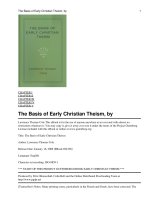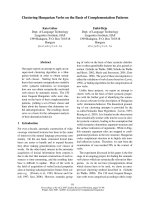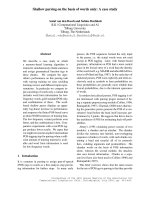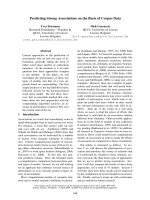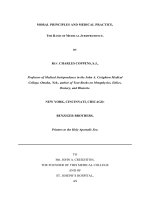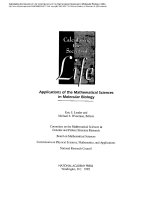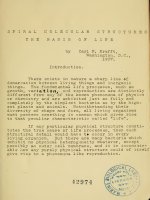krafft carl - spiral molecular structure the basis of life
Bạn đang xem bản rút gọn của tài liệu. Xem và tải ngay bản đầy đủ của tài liệu tại đây (670.99 KB, 17 trang )
SPIRAL LiOLECULAR
STRUCTURES
THE
BASIS
OF
LIFE
by Carl F.
Krafft,
Washington,
D.C.,
1927.
Introduction.
There exists
in
na^ture
a
sharp
line of
demarcation
between
living
things and
inorganic
things.
The fundaniental
life processes, such
as
grov;th,
variaitioo.
and reproduction are distinctly
\
different
from any of
the
knov/n phenomena
of
ph3/-sics
or
chemistry
and are
exhibited
just as fully
and
completely by the
simplest bacteria
as by the
high-
est
plants and animals.
Notwithstanding
their
diversity
of
shape and
form,
all
living
organisms
must possess something
in
common
which gives
rise
to
that peculiar characteristic
ceJled
"life".
If any particular
physical structure
consti-
tutes
the
true cause of
life
processes,
then
such
structural
detail would have
t»
occur
in every
living
organism.
But there
are
many
bacteria
which
exhibit
no physical heterogeneity
v/hatever,
except
possibly
an outer cell
membrane,
and
it
is
inconceiv-
able
how
any purely
physical
structure
could
of
itself
give rise
to a phenomena
like
reproduction.
12974
t^^'
Basis
of
Life.
That the
fundamental
life
processes
must
"be
due, either wholly
or
partly,
to
specific
chemical
structures
is
generally
conceded,
"but
there
is
a
prevailing
opinion
that the
oheminal
structures
which are
necessary
for
this
purpose
must
he
extreme-
ly complex.
There is,
hov/ever,
no
very
sound
founda-
tion
for this opinion. The
compl
ex
structures
observed
in
the
highar plants and
animals
are the
result
of
evolution,
and
the fact that
they
are
indispensihl
e
to
the
proper
physiological
functioning
of certain
higher
organisms
dees not
prove
that
they
are
the real
cause
of the
fundamental life
processes
in the
lower
organisms.
If
extremiCly complex
structures
T7ere
necessary
for
life
of
any
sort, then
it would
he
highly
imprcbahle
that life
could
ever have originated
spontaneously.
It seems
mere
reasonable to
assume that
life
is
due
tc
s
3me
comparatively aimple principle of
chemistry
which
has not
yet
heen discovered. To
find
the
clue to
this
we must investigate the mol
ecular
structure
of
proteins, hecattaB
proteins constitute
nearly
all
the solid
matter in the "bodies
of
uni-
cellular
orgajiisms
after removal of the water.
All
protein
substances,
upon
hydrolytic
decomposition,
yield a mixture
of
amino
acids
having
the follov/ing
molecular
structure;
NHg-CRH-CO-CH,
where
R may
he any
one
of
vai*ious
complex
groups.
(E.
Klarmann,
Chemical Reviews,
Vol.
IV,
p
51,
1927)
These
amine
acids
will
readily
condense,
with
the
elimination
of water,
to
form
either
chain
structures
known as
polypeptides,
or
ring
structures
known
as
diketopiperazines
:
17Hn.CfiH.C0.0H
=
ITHg
.
CRH
.
CO
.
NH
.
CRK
.
CO .
1:H
.
CRH
.
CO
.
C
H
+
2
,
KgO
;
2
1^2.
CRH.
CO.
OH
-^
.
CRH
-
CO
•
CO-
CRH
^
IvTH
ITH
+
2
HoO.
(Emil Fisch3r, Unt arsuchungen iilDer
Aminosauren,
Polyp
3ptide, und Prote^na,
1899
-
1906)
Since proteins constitute the principi,!,
structure-building food
for
anirna^ls,
and upon
digestion
are
chang
?d
to
amino acids in v/hich
form
they are assimilated
03'
the tissues, it
is
generally thought
that
the phenomenon
of grov/th
involv?s condensation xjroc^sses of
a similar
character.
Polypeptides
will readily unite
v^ith
additional amino
acid
molecules
and thus
undergo
a.
process somewhat
analogous to growth,
"but
the
different parts
of
the
oolypeptide
mol 3cul i?
are
not
fixadly coordinated
with
on 2
anothor
in
space
so
that
it
lacks
that d3finite
morphology
which
is
characteristic
of
all living
organisms.
Dik
etopip
erazin
3S,
on the
other
hand,
do
possess
a
somewhat
more definit3
morphology,
"but
will
not
condens
3 with additional
amino acid
molscules.
The essential characteristics
of
these two
structurss can,
howev3r, be
combined.
If
we assume that
the
valencies
of
the
carbon
atom are arranged
like
the
corners
of
a
regular
tetrahedron,
and that
the
three
valencies
of tri-valent
nitrogon
in
amino
compounds
are
about
equally
distributed-
around
an
equatorial
aircle,
(which
arrangement
appears
to
be
the
only
one
vfhich
is
consistent
with
all
known
chemical
facts,)
then the
polypeptide
chain,
whan
coiled
around
on
its-3lf,
will
assume
the
foinn of
a
spiral or
helix having
substantially
th
3
same
diameter
as
the
diketopiperazine ring:
R
A
polypeptide
spiral in ITaCl
solution.
Th8
nitrogen
atoms will
appear in
two rows
on
opposite
sides
of the spiral, and
the
complex
side chains
represented
by
the R's
in
the
above
equations,
as well
as the carbonyl
groups, will
likewise
arrange
themselves along
other
diametrically
opposite
lines. Chsmical
union will probably take
place
between
the
successive
carbonyl groups
in
the
manner
shown, and
also betv\reen the successive
nitrogen
atoms,
the fourth and fifth
valencies
of
which
are
known to have
a
peculiar tendency to
assume
opposite charges. The
nitrogen
atoms
at
the
ends
of
the spiral will probably
unite
with
the
ions
of inorganic
salts, the presence of
which is
necessary
for the
nourishment
of
all
living
organisms.
It will
be found,
upon
actually
con-
structing
this spiral
of
atomic models,
that
there
is
ample
room for the compl
3X
side
chains R
if
the
fourth val
ency
of
the
alpha carbon atom
is
occupied
by
hydrogen,
but
that the
presence
of
more
complex
groups
in
this position
would
make
the
spiral
structure
impossible.
We
find,
however,
that
the
decomposition
products
of
natural
proteins
always
have 3.
hydrogen atom
in this
position.
r:-som^lanco
in
g3noral
shape
and
form
of
a
polyp
optide spiral
tc a
baci]ljis
will
bs
apparent.
It will
"be capable
of
grovjtng
endv/ise
by
condensation
with
additional
amino
acid
mol
2-
cul
es,
and will
poscess
definite
morphology.
It
must r3Tnain
p3rmanently
right-handed
or
left-
handed, v'hich
would
appear
to
account
for
the
optical
activity
always
exhibited
by
substances
obtained
from living
organisms.
It
would
also
be
capabl
e
of
acquiring
various
arrays
of
side
chains
upon
being nourished
with
different
kinds
of amino
acids,
and
thus exhibit
the
characteristic
of
variability.
It
would not,
howev2r,
be
capable,
upon
division,
of
transmitting
to
its
progeny
any
permanently
inheritable
variations,
and
could
thorefore
not
be
regarded as a
complete
living
organism.
The
smallest living
bacillus
is about a
thousand
times largsr than
an
individual
poly-
peptide spiral,
and
very likely
consists
of
large
numbers
of
such
spirals in
pp.rallel
formation,
eith
3r as a
solid
rod
or as a
hollow cylinder.
The
complex
side
chains
represented
by
the
R's
in
the
above
diagram
evidently
furnish
the
moans
for
connecting
together
adjacent
spirals. The
arrangement
and
spacing
of
the
diffsrent
spirals
will
be
subject
to
a
certain
amount
of
variation,
depending
on
the
nature
of
the
molecular complexes
v/hich
connect
them,
but
whatever the
arrangement is,
it
must
necessp.rily
be maintained
throughout
growth,
and will,
upon
division, be transmitted
to
the
progeny
oy
a
process
of
heredity.
It
appears
that thare are only
a limited
number
of
ways
in
which adjacent
spirals
can be
connected
together. We
may,
for
example,
connect
together
two adjacent
spirals edge
to
edg3
so
as
to
form
a flat
sheet,
but
this
arrangem.
ent
cannot
occur
very
extensively in nature
because
pro to
-
plasm.ic
substances
are
usually
three
dim3nsional.
r^ad
in
ord2r would
"b
3
a
connection
lostwaen
throo
,c3nt spirals,
which
may
"be
ac(
•
-
-
.i]y
as
follows:
ows
:
icomplishod
very
C
\
C
%> ::'Z/J
Th3
sxistence
of
similar
structuros in
naturo
ovidencod
by
th
3
f r
3qu
3nt
occurronce,
among
protein
disintegration
products, of leucine,
CH,
is
^3
CH,
:,
CH-CHg-CHlTHgCC-OH,
which
has a
siTiilar
triple
connection at the
gamraa
carbon
atom.
It R.ppears
to
be at these triple
junctions
wh
3
r
e some
of
th
e r am
ark
ab
1
e
ch em i
c
al changes
occur
which
take
place
in living organisms.
The
three
adjacent
spirals
hold their
amino acid
molecules
in
definitely
ccordinatsd
positions,
which
should have
a profound effect upon
their
chemical
b3havior.
The
triple
connection is
probably
the
arrangement
Wi.ich
occurs most
frea_uently
in
nature,
because
a
n^.mber
of wuch
groups
will
collectively
form
a
cluster
of
hexagonal compartments,
and
we
know
that
the hexagon
is
one
of
the
fev/
figures
which
will
completely
cover
a
certain
area,
as for
instance
the
cro ss-
sectional
area of
a
bacillus.
^
\.
The only other possi
bil
i ti
3S
are rectangular and
triangular
cacapartments ,
but
the
existence
of
these
appears
highly improbahx
e,
except
at the
surfac:-'S,
"because they
would reo^uire
the coupling
tog:ther
of four
and six
spirals respectively,
which
appears
to
Toe
irnpossihle
of
accornpl
ishment
with
any
knov-n
type
of
raolecular
structure.
A
cluster
of
three
polypeptide
spirals
with a
complete
triple junction at
the
center
ought
to
possess
all
th^ fundamental
characteristics
of
life,
provided it can
he
equipped
with
a
stable
outer
structure. A
group
of three
hexagonal
com-
partments
as
illustrated
above
could
probably not
exist in
nature
because each compartment would
have
thr3e
exposed outer
corners
which would
render
it
very
vulnerable.
Regardless
of how ;'
-many
additional
hexagonal
compartments we add
to
this
structure,
the maximum
number
of
exposed
corners
can
never
be
less
than
two.
But at
the
surface
of the
organism
there is
no
real
necessity
for
confining
ourselves
to
the use of
hexagons.
If,
for example,
v/e
foim
the
surface
structure
of
pentagons
instead
of
hexagons, the
number
of
ex-
posed
corners
on
each
compartment
would
be
reduced
to
one, and
our organism will
appear
in cross
section
somewhat
as
follows:
Or-Gk.
Th3
outermost corners
of
the
pentagons
v;il]
probably
not
b
2 formed by
the gamma
carbon
atoms
as
in
the case
of
hexagons,
but
th3re are
substances
such as
cystine,
S-GH2.CPim2.COOH
S-CH2.CHl^^o.C00H,
among
the
decomposition
products of
proteins
which
suggest
other
types
of
structures
for
connecting
together adjacent polypeptide
spirals.
The
presence
of
a
peripheral region
structurally
different from the
interior
also
seems
to
account
for
the tendency
of
unicellular
organisms
to divide.
Except
in
rare
cases
of
coincidence,
different
molecular
structures
would occupy
different amounts of
space,
so
that
as
the organism
increases
in 1
ength
there
will
be a
point
reached when the
expansive
force
of
th
:5
more bulky
structure will tear
apart
the
less
bulky
structure,
so as to
cause
the
organism
to
divide
into
two
halves. Most
bacteria
have
rounded
ends, which appears
to
indicate
that
the
interior
structure
is
more
bulky
than
the
peri-
pheral
structure,
but
there
ar 2
a
few
species
with
concave ends in which
the
reverse
condition
appears
to
exist.
Although
the
nbovo
hypothopis
will
not
readily
1
ond itself
for
verification
"by
ordin-^.ry
chemical
analysis,
yet
its
correctness
is
r3ndered
highly
prohabl
e
by
the fact
that
it
appears
to offer
a
satisfactory
explanation
of the
follow-
ing phenomena:
1
.
Grov/th;
2.
Variability;
3.
Spontaneous
division;
4. Inheritance
of structural
variations;
5.
The rod-like or
thread-like
form of many
of the
lov^rer
organisms;
6. The optical
activity
of substances
obtained
from living
tissues;
7.
The large
porcentage
of wat
3r
in
living
L -L
S
iC'U. *>
k."
J
8. The
need for inorganic salts
by all living
organisms
;
9.
The
remarkable chemical changes
which
occur
during
metabolism;
10. The
neces^'ity for
amino
-cids
with complex
side chains
for the
nourishment of
all
animals;
11.
The alpha
position
of the
amino group
in
amino
acids
obtained from
proteins;
12.
The
alpha
hydrogen atom
in
such
acids.
>^
"x^:
'%
